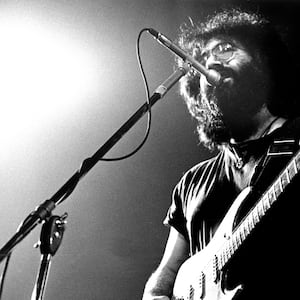Robert Hunter’s long strange trip is over. The principal lyricist for the Grateful Dead died on Sept. 23 at the age of 78, in his own bed, surrounded by family, who have not released a cause of death. So, peaceful, but with a little unresolved mystery, exactly like a Hunter lyric in other words.
Try explicating some of Hunter’s early lyrics for the songs he wrote with lead guitarist and vocalist Jerry Garcia, and pretty soon into your exegesis you’re going to fall back on a sort of “you had to be there” argument. Explaining “China Cat Sunflower” or “Dark Star” was like explaining an acid trip to someone who’s never taken acid. No surprise to learn that Hunter wrote a lot of those early lyrics while he was tripping.
Of course, if you can write a song, any song, while you’re tripping, that puts you way out in front of most everyone else. In this respect, it helps to know that Hunter was not just some hippy-dippy poet (although he was reportedly the great-great-grandson of Robert Burns). He was also an actual musician—he partnered with Garcia long before the formation of the Dead, when both were part of California’s bluegrass/coffee house scene, and what he didn’t know about how songs worked, Garcia was there to teach him. He was a fast learner.

The Grateful Dead's Robert Hunter
Ed PerlsteinEven before the Dead entered their folky/country phase with Workingman’s Dead, Hunter was writing songs that drew on traditional music in the best way. “Dupree’s Diamond Blues” does not flat out copy songs like “Frankie and Johnny,” but Hunter had plainly put in his time absorbing old blues and folk songs that told stories about thieves, jellyroll, wayward lovers, and betrayal. In the same way, “Mountains of the Moon,” which is simply one of the most haunting, mysterious songs written in the last century, tipped its hat to old English balladry and then went its own way. Hunter plainly loved traditions, but he wasn’t bound by them.
Probably the best example of this is “Cumberland Blues,” off Workingman’s Dead. The story has circulated for years about the kid who played the song for his grandfather, who didn’t give a hoot for rock and roll but said that old traditional bluegrass song the Dead played was the real deal, having no idea that the tune was a Hunter/Garcia original. (Extra bonus [no lyrical content]: listen to how the song begins played on electric instruments and morphs into an acoustic version by song’s end.)
Hunter, so far as I know, never appeared on stage with the Dead, but his lyrics are as much a part of their identity as anything actually played by the other musicians. His words, which managed to be both concrete and elliptical, force a listener to become part collaborator: you finish what he started in your head. Your version is your own, and yet you are part of something larger. Robert Hunter was the master when it came to creating songs that are intensely personal and communal.
After Garcia died in 1995, Hunter went on to collaborate with any number of other songwriters, but none as famous as Bob Dylan, who respected Hunter so much that he was the one writing partner who Dylan allowed to change things. “He’s got a way with words and I do too,” Dylan told Rolling Stone. “We both write a different type of song than what passes today for songwriting.” Indeed.
The Dead never entirely escaped their Haight Ashbury, hippie origins, but anyone who’s ever listened closely knows that’s merely where they started. There was always more to the music, some solid core that bespeaks joy, intelligence, and a full-throated love of rock and roll, and no one had more to do with that than Hunter. There was nothing sentimental or mushwitted about anything he wrote (“New Speedway Boogie’s” conjuring of Altamont and its fallout is as dark as songs get). At his best, and he was at his best more often than not, he and Garcia wrote songs that sound as old as time and shone as bright as a new dime. They stick in your head in the best way possible: you can’t forget them and you wouldn’t want to—they’ll see you through life.





